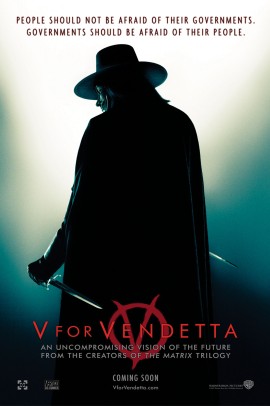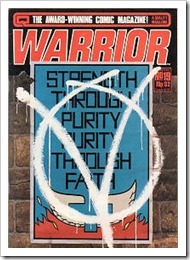V for Vendetta (2005)
Synopsis
Iconic graphic novel turned Hollywood block buster, V for Vendetta tells the story of a masked avenger’s retribution against his government for the horrors inflicted upon him and its people. More than a story about one man’s personal Vendetta, V is a story about a society caught in the grip of unconscious, power-hungry men. A powerful piece of countercultural storytelling, V for Vendetta has inspired a generation of anti-institutionalists.

| Genre | Action, Thriller |
| Production year | 2005 |
| Director | James McTeigue |
| Male actors | Hugo Weaving, Stephen Fry, John Hurt |
Finding freedom in the face of tyranny
by Eivind Figenschau Skjellum
A brief background
 In 1982, the first installment of the graphic novel V for Vendetta arrived on publishing house Warrior and introduced a new paradigm in comic books. Bypassing the usual American superhero formula, V for Vendetta was written for adults about highly charged political themes.
In 1982, the first installment of the graphic novel V for Vendetta arrived on publishing house Warrior and introduced a new paradigm in comic books. Bypassing the usual American superhero formula, V for Vendetta was written for adults about highly charged political themes.
But the story of the episodical graphic novel is heavily rewritten for the silver screen. It has changed in the process from a story with an unpredictable dramatic arc in which V yearns for anarchy and revenge, to one in which V becomes a heroic character that inspires revolt in the people in order for them to wake up and reclaim their civil liberties.
In that way, the big-screen dramatization of the graphic novel takes it one step back towards the tradition of superheros that the graphic novel bravely stepped out of.
V, Evey and the people of England
We first see V in action when Evey, an average London lass, is assaulted by Fingermen (secret police) who intend to rape and kill her. V graces them with his own brand of vigilante justice and then takes her to a rooftop nearby to watch with him his destruction of the Old Bailey, London’s Central Criminal Court, to the crescendo of Tchaikovsky’s 1812 overture.
We find ourselves in a near-future England. The nuclear war that the US started has ended and much of the world lies in ruin. The US is now but a “leper colony” where civil war rages. England has not partaken in the war, but the chaos of the surrounding world looms on its doorsteps.
Abusing the fear like only the extreme right knows, the fascist Norsefire party has manipulated the English into silent obedience and High Chancellor Adam Sutler now reigns supreme. The country has been quarantined and cleansed of the diseased, degenerates, sexual deviants and infidels. Norsefire’s political opposition, amongst which Evey’s now-deceased parents once belonged, has been exterminated in concentration camps.
There is a powerful scene in these early parts of the movie in which V storms the British Television Network in order to broadcast his message to the masses. “There is something terribly wrong about this country, isn’t there?” says V.
His message is powerful because of where he puts the blame: The people of England. There is no “you are victims ra ra ra”-talk. No, it’s a challenge to the people to accept responsibility for the status quo, for letting themselves be manipulated into apathy and submission. V is actually, in a funny way, blessing them. He is seeing in the people the capacity to overcome, to reclaim their true greatness and self-worth.
The Shadow King in Norsefire and the people of England
In the King-quadrant of the archetypal mandala, we find the dynamic of the abdication syndrome. The abdication syndrome is a term that describes what happens when a human being refuses to sit on his own throne in life. When I fail to sit on my own throne, I will place another on it – or someone will place themselves there. Since the presence on that throne is the defining presence in a man’s psyche, this is nothing less than a personal disaster.
The problem with the media, as it operates in the world today, is that it inspires the abdication syndrome in its consumers. Advertising tells us we are shit and the news tells us we are fucked. In such a world, an average person must look for some safety and comfort, and a tyrant will always be happy to provide it (for he knows how to expand his power base). It’s a good thing for the person with an inclination towards tyranny that the media is so easily manipulated into supporting agendas of subversion (Rupert Murdoch anyone?).
But as always, it behooves us to remember the bipolar nature of the archetypal shadow. This means that the abdication syndrome finds its counterpart in the usurpation syndrome. In the usurpation syndrome, the Ego takes over as the King. The Ego is never meant to come into close proximity with archetypal energies – its role is to keep a functional distance from them and provide a healthy structure for facilitating the vast powers of the collective unconscious in which the archetypes live. But when the Ego gets too close to these archetypal energies, it suffers “radiation damage” (quoting Robert Moore) and something twisted happens in a man.
In V for Vendetta we see the abdication syndrome embodied by the people of England. This is what V speaks to in the clip above. The usurpation syndrome, on the other hand, is embodied by members of the Norsefire party. But these polar opposites live in every man and woman. To drive this home in a way that helps you really get this – for this insight is vital in any man’s life – let’s have a look at the scene where V arrives at Lewis Prothero’s home, the leading propagandist of the Norsefire party. Have a look:
In the real world, you need look no further than Fox News for a feeding frenzy of archetypally inflated people who cast their web of deceit and lies over an unsuspecting public.
Posing as the force of good – as do all tyrants and manipulators – they sound increasingly like the propaganda ministry of a police state.
Finch: A glimmer of hope in a pile of shit
Chief Inspector Finch is the man who is investigating the case of V. He seems to be one of the few men in a position of power with some moral fibre left in him. As he penetrates ever deeper down the rabbit hole, Finch and his assistant Dominic start excavating the contours of something sinister in their own ranks.
The leadership of the Norsefire party, it turns out, is responsible for what was thought to be a terrorist attack. Instead of testing their new virus on foreign powers, they decided it was just as well to test it on their own. In the process, they have killed 100.000 and blamed it on religious extremists. This gave them the necessary alibi to instate a fascist police state. (This plotline is remarkably similar to the conspiracy theories surrounding 9.11.)
When Finch learns the horrific backstory of his employer’s rise to power, his loyalty starts wavering. While afraid, Finch is a man who still knows the meaning of integrity. He knows that a man whose work contributes to the suffering of the people and the planet will face his judgment in the silent hours of the night.
Valerie’s Scarlet Carsons
In its dichotomy of fascism vs anarchy, I can choose to see V for Vendetta, roughly put, as a movie also about the masculine vs the feminine. Fascism, as I see it, is a masculine perversion – a system of control so tight that free will all but disappears. The argument is always the safety of the people (“for your protection”), but the price is always the people’s freedom.
Where there is extreme masculine pathology, there is no room for the feminine (and vice versa). In such a world, nature is terrorized, dance and music is outlawed. Culture ceases to exist as a means to inspire the hearts and souls of the people. The “sacred garden” is lost to man. The tree of life withers and dies, the once magnificent rivers run dry and the birds sing no more. There is no beauty here.
In the graphic novel, V – himself a test subject at Larkhill – tends a garden with Lewis Prothero’s permission. That’s how he gains access to the chemicals needed to blow up and escape the place. And when his mission of retribution starts, V leaves a Scarlet Carson – a beautiful red rose – at the side of all the people he kills.
Valerie also used to grow Scarlet Carsons. She was another test subject at Larkhill who wrote the story of her life on a piece of toilet paper before she died. V is in many ways a masculine machine – hell-bent on retribution and on fulfilling his mission. But in his heart, he carries the seed of Valerie – whose beautiful words he found hidden in the wall of his cell. They have opened some soft and precious part in him – crucial, it seems, to his sanity.
Valerie seems to be the most precious thing in V’s world. That is, until he meets Evey.
Through his peculiar relationships to Valerie and Evey, the Lover in V comes out. It is the greatest gift, he explains to Evey as he bleeds to death, she could have given him. This fact may contribute to some young men out there embracing more of that sensitivity in themselves.
The relevance for today’s world
Clearly, V for Vendetta is a comment on a society its creators think have gone off the hinges. I mostly agree with them. The country that worries me most today is the US, but similar tendencies exist elsewhere. What passes as truth today in large parts of the so-called civilized world is deeply worrying.
That a news channel like Fox News has enough viewers to warrant its existence is in and of itself troubling. That it’s probably the most popular news channel in the US is downright scary. I see there a parade of wounded men and women so afraid to start their path of healing that they succumb to massive archetypal inflation. The results are ugly.
 I’ve read my Ken Wilber and I know that there is such a thing as levels of development and that our ability to embrace bigger perspectives comes only with time. But the extreme religious right in the US seems to be getting worse, not better. They seem possessed by some archetypal force of such malicious intent that I am concerned for the fate of the world were they to come to power. Their level of immaturity seems limitless. Their willingness to sanctify their worst parts and to deify themselves in the pursuits of absolute world domination is evil.
I’ve read my Ken Wilber and I know that there is such a thing as levels of development and that our ability to embrace bigger perspectives comes only with time. But the extreme religious right in the US seems to be getting worse, not better. They seem possessed by some archetypal force of such malicious intent that I am concerned for the fate of the world were they to come to power. Their level of immaturity seems limitless. Their willingness to sanctify their worst parts and to deify themselves in the pursuits of absolute world domination is evil.
But there is a huge movement towards good as well in the world. The rising level of dissatisfaction with the status quo amongst the people and our willingness to address the challenges using non-violent means is a cause for enormous optimism.
Whether we speak of the rose march here in Oslo after the heinous acts of terror last summer, the broomstick armies in London after the London riots or the Occupy movement of Wall Street, we see signs of people mobilizing at a grassroots level across the globe. No wonder legislators are trying to pass laws that will limit freedom of speech online. Remember, it is “for our protection”. (after starting my work on this review, I have seen these exact words printed in myriad places where camera surveillance is in operation. It has sent chills through me.)
We have answered V’s call in time and the fact that hacker activist group Anonymous (whose intentions I’m not convinced are wholly generative) has adopted his mask as their public face is testament to V’s cultural impact. It seems that there is now a real opportunity for a shift into a new era of inclusiveness, love and shared humanity.
I believe this is the reason why the Lover-suppressing religious right is turning increasingly extreme. The forces of good in the world are gathering momentum – and since the extreme religious right together with monster-boy capitalists are hell-bent on maintaining a society where all expressions of true freedom are policed out of existence, they must be getting really antsy.
 The bottom line is that the polarization in V for Vendetta is happening in the real world as well. But thankfully, it seems like the “forces of good” in real life follow a path different to anarchy. I’m wary of idealizing V too much, because lawlessness and a dismantling of social structure seems a poor answer for the challenges we face. Aspiring to V’s path of anarchy is, I believe, misguided. We must follow the middle way, including in the process the healthy parts of left and right, feminine and masculine.
The bottom line is that the polarization in V for Vendetta is happening in the real world as well. But thankfully, it seems like the “forces of good” in real life follow a path different to anarchy. I’m wary of idealizing V too much, because lawlessness and a dismantling of social structure seems a poor answer for the challenges we face. Aspiring to V’s path of anarchy is, I believe, misguided. We must follow the middle way, including in the process the healthy parts of left and right, feminine and masculine.
Conclusion
In the movie, V intends to give the people back their power by killing all the heads of Norsefire party before blowing up the houses of Parliament. It is a symbolic act, he believes, of great importance, and by the end of the movie, his Fawkesian plot has been brought to completion.
Evey is the one who pulls the lever which sends the metro train V filled with 100% English Fertilizer (clever irony) to its final destination. She does so because she has come to care for him – and come to believe in the power of his idea. Chief Inspector Finch gets his chance to prevent it, but in his heart, he realizes that the fulfillment of V’s plot is the lesser evil.
The movie suggests that in the worst possible circumstances, actions normally referred to as terror may be morally justified. I can agree in principle, but I still don’t support the overall message. And in truth, the somewhat happy ending of the movie isn’t true to the source material anyway (which ends on a more gloomy note).
I believe that V for Vendetta’s true strength lies in its powerful depiction of a whole people’s willingness to stand down and let themselves be imprisoned by a police state. They let it happen, it appears, because of the huge gravitational pull of their own comfort zones. This is powerful and tells me, in effect, that my own personal journey of challenging my fears has huge socio-cultural implications.
Indeed, only by challenging our comfort zones and fully taking part in the human story can we become truly generative citizens. That is what you left me with, V, and it is no small thing.
Powerful ideas from V for Vendetta
- As a tyrant, I can herd an entire people into submission if I can make them believe they are shitty enough and then pump them full of fear. This is a reminder to become a more conscious media consumer.
- Although V was single-mindedly focused on his mission, it was the seed of love Evey and Valerie planted in him that occupied him in the last seconds of his life.
- The power of unconscious men is looming as a huge threat and we must fight it every step of the way.
- V suggests that governments should be afraid of the people, not the other way around. I say better we rid ourselves of fear altogether. But the main point remains – the people of the world must mobilize on a grassroots level to become powerful. Start small – start a local community today!
- If I don't actively challenge my own comfort zones, my life becomes vulnerable to a hostile takeover. To prevent this usurpation syndrome from happening, the inner King needs to be nourished in any way possible. Blessing someone is a good start.







